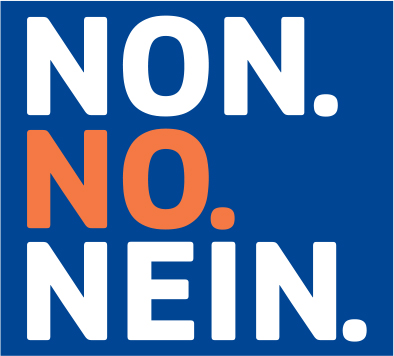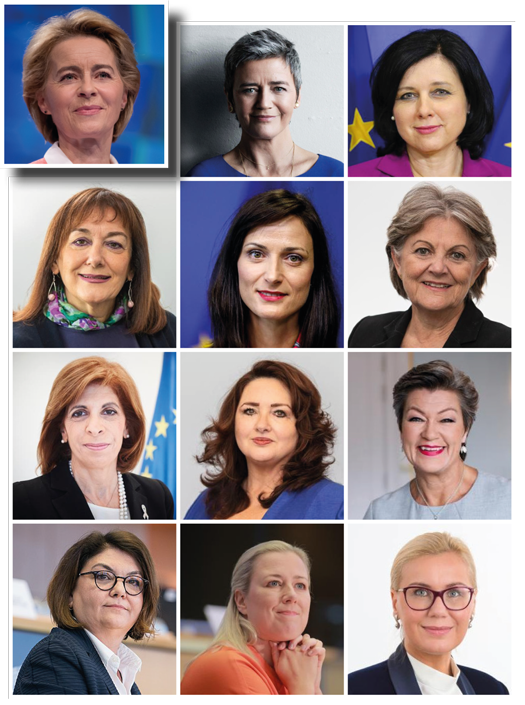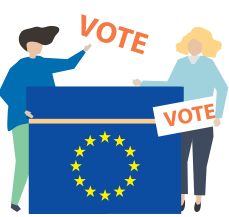Spotlight on EU ACTION FOR WOMEN
February 2020
February 2020
Equality between women and men is a fundamental value of the European Union, dating back to the 1957 Treaty of Rome, which established the principle of equal pay for equal work. Since then, the EU has continued to tackle gender-based discrimination and today Europe is one of the safest and fairest places for women in the world.
However, the fight for and protection of women's rights is still necessary. Although women in Europe should enjoy equality, empowerment and safety, for far too many women these rights are not yet a reality. Statistics show that women are under-represented in decision-making positions in politics and business and still earn on average 16 % less than men across the EU. Gender-based violence and harassment remain widespread.


The EU aims to give women the same opportunities as men in the workplace, such as equal pay, and to help both men and women to strike a better balance between work and other areas of life. Another major priority is to stop violence against women and girls and to promote gender equality in the EU and across the world. The EU also promotes equality between men and women in decision-making positions. The European Commission’s work in all these areas is based on its strategic engagement for gender equality 2016-2019.
Many women are still not achieving full economic independence. Barriers to participating in the labour market and the care-giving responsibilities of many women are some of the reasons why women tend to work less than men and in lower-paid sectors, take more career breaks and face fewer and slower promotions. However, the EU is committed to providing women with equal opportunities in employment and equal pay.
In 2017, 66.5 % of women aged 20 to 64 in the EU were in work, up from 62.1 % in 2010. The employment rate for men was 78 % in 2017 and 75.1 % in 2010. The principle of equal pay is included in the EU treaties and in the rules on gender equality in the labour market, however it remains a challenge in all Member States to ensure that the rules are correctly applied.


In 2017, the EU presented an action plan to close the gap between what women and men are paid. The plan tackles issues such as stereotypes and work-life balance and calls on governments, employers and trade unions to take action to ensure that women’s pay is determined fairly.
Work-Life Balance
Gender equality is not only an issue for women, but also for men. It is at the heart of the European Pillar of Social Rights, which aims for the equality of treatment and opportunities between women and men in all areas. This includes participation in the labour market, employment conditions, and career progression.
A directive adopted by the EU in 2014 makes it compulsory for large listed companies to publish information about their company boards with regard to their diversity policy, such as age, gender and educational and professional backgrounds.
But life is not all about work and money. Striking a balance between working, securing your income and having time for yourself and your family is an important consideration for both women and men.

The European Commission’s work-life balance initiative delivers on the pillar’s principle of equal treatment and introduces new rights - or strengthens existing ones - at EU level to help balance the sharing of care responsibilities between women and men, and thereby support women’s employment. These cover paternity, parental, and carers’ leave, as well as flexible working arrangements for parents and carers.
The initiative also contains a set of measures to support Member States in protecting pregnant workers as well as people who take family leave from dismissal, in improving the provision of care services and in addressing economic disincentives for second earners.
Health issues can be different for women and men. The EU's third Health Programme aims to ensure that people have equal chances of good health and quality healthcare, regardless of their gender.


The EU takes the specific needs of women into account across its different spending programmes and policies, and every year the European Social Fund helps millions of people facing a variety of challenges to improve their access to jobs.
Specific actions to help get women into work include schemes to retrain and improve skills. The fund also enables women to return to work after a career break, for example by providing quality childcare and individual guidance, and by improving employers’ awareness of the challenges faced by women. The European Social Fund supports projects in your country. Its many successful initiatives are making a real difference to people’s lives.
Projects financed in the EU’s regions provide women with new opportunities through access to financing, personalised support or coaching to help start a business. You can find programmes and projects in your country or region.
The WEgate platform is a one-stop shop for women who want to start or grow a business, with information on training, mentoring, advice and networking. You can also find out how EU loans and venture capital can enable you to set up or grow your business.
The EU is also taking action to boost women’s participation in the digital sector by challenging stereotypes, promoting education and training in digital skills, and encouraging more female entrepreneurs in the sector. The European Network for Women in Digital was launched in 2018 so that girls and women in the digital sector can network and collaborate on ideas and experiences in this field. Some 20 tech companies have also committed to provide an inclusive and gender-balanced work culture and environment.
The EU is also committed to closing gender gaps in research and innovation. For example, the Horizon 2020 programme helps research organisations and universities to implement gender equality plans. Every year, the EU Prize for Women Innovators recognises women who are not just excellent researchers and innovators but successful entrepreneurs too. The EU is also taking action to improve women’s employment in other sectors such as transport.


Everybody has the right to live a life free of violence. However, violence towards women and girls is on the rise around the globe. In many places, attitudes towards victims contribute to the problem: a 2016 Eurobarometer survey revealed that violence against women is still accepted and even justified in some countries in the EU. The majority of victims of trafficking reported in the EU are women and girls. Anti-trafficking legislation in the EU creates obligations to adopt gender-specific measures, and is accompanied by policy measures and financial programmes to support Member States.
All EU Member States, as well as the European Union itself, have signed the Council of Europe convention on preventing and combating violence against women and domestic violence (also known as the Istanbul convention). The convention obliges countries to prevent and criminalise all forms of violence, protect victims and prosecute perpetrators.

The EU’s NON.NO.NEIN campaign encourages men and women to take a stand against violence against women. The EU also funds projects on combating gender-based violence and supporting its victims under the Rights, Equality and Citizenship programme.
At global level, in 2017 the EU and the United Nations launched the Spotlight Initiative to eliminate all forms of violence against women and girls. It was supported with a commitment of €500 million from the EU.

You have rights and can take action if you think they have been breached. For more information on how non-discrimination and equal treatment apply in your own country, you can contact the appropriate national member of the European Network of Equality Bodies, which was set up to promote a uniform application of EU law in these fields.
Every year, the European Commission publishes a wide-ranging report on the state of gender equality in the EU. The judgments of the Court of Justice of the European Union play an important role in promoting equality between women and men, ensuring that EU law is interpreted and applied in the same way in every EU country.

The European Institute for Gender Equality supports Member States and the EU in their efforts to promote and ensure equal opportunities for women and men across Europe and beyond. The institute’s Gender Equality Index monitors progress. The European Commission supports European networks of civil society organisations, including the European Women’s Lobby, Women Against Violence Europe, the European Network for the Work with Perpetrators of Domestic Violence, and the END FGM European Network. They work closely with the EU institutions on issues of women’s rights and equality between men and women, and can also put you in touch with relevant organisations in your own country.
The EU is working to help women break glass ceilings in business and politics. It is doing this by working with governments, businesses, trade unions and non-governmental organisations to design and implement EU-wide activities on gender balance at top levels, by collecting and disseminating information, and by promoting good practices.
In December 2019, Ursula von der Leyen became the first female President of the European Commission. Christine Lagarde took office as the head of the European Central Bank in November 2019, making her the first female President of the ECB. Emily O’Reilly is the European Ombudsman, who investigates complaints of poor administration by EU institutions.
The rules that govern employment in the EU institutions must be applied without any discrimination based on sex, including as regards pay. Staff are entitled to parental or family leave. The European Commission does not discriminate in the recruitment or promotion of staff, and it provides a respectful and flexible working environment for its employees. The Commission also has a strategy in place to promote work-life balance and the well-being of staff.

Former European Commission President Juncker set a target of ensuring at least 40% of the European Commission's middle and senior managers are women by the end of his mandate in 2019. As of October 2019, women accounted for 41% of all managers, up from 30% in 2014.

The European Parliament elections resulted in a slight increase in the number of female members to 39.4% - a record high. In seven Member States women filled 50% or more of the seats: Denmark, Latvia, Luxembourg, Malta, Slovenia, Finland and Sweden.


The European Union aims to improve the lives of girls and women worldwide through its policies, in particular the Framework for Gender Equality and Women’s Empowerment. Through this framework, the EU aims to support partner countries, especially in developing, enlargement and neighbouring countries, to achieve real results in the area of gender equality set out in its action plan.
The EU further pursues gender equality in development cooperation by making it a priority in political and policy dialogues with partner countries. For example, in the context of trade negotiations with Chile, the EU has, for the first time, proposed provisions on trade and gender equality.
The EU’s twin-track approach focuses on gender mainstreaming and gender specific actions in a number of areas: capacity-building for developing countries; support for women’s organisations; and disseminating information on gender equality through guidelines, best practices and awareness raising.
The EU has also led the way in negotiating the inclusion of gender equality targets in the UN’s 2030 Agenda for Sustainable Development. These targets focus on eliminating violence against women, on recognising unpaid care and domestic work and on universal access to sexual and reproductive health and reproductive rights. In addition, there is an explicit commitment to gender mainstreaming of all sustainable development goals, targets and indicators.

The EU and its Member States are also committed to including a strong gender component in all their policies and practices in their relations with developing countries. This is done through the 2017 European Consensus on Development. Among the key objectives are strengthening policy dialogue to empower women and girls, promoting their important role in development and change, and increasing targeted action towards gender equality.
Over the last 2 years, the EU has supported more than 1.5 million girls and women with services for protection and care related to female genital mutilation. As a result, 3 000 communities, representing 8.5 million people, made public declarations on abandoning this practice.

The EU also recognises women fighting for their rights across the world. Islamic State survivors Nadia Murad and Lamiya Aji Bashar and Pakistani campaigner for girls’ education Malala Yousafzai have received the European Parliament’s Sakharov Prize.
In addition, candidate countries working towards becoming members of the EU must fully embrace the fundamental principle of equality between women and men and must work to include EU legislation in this area in their own structures. This remains a priority of the enlargement process.